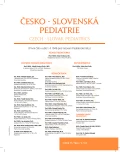-
Články
- Časopisy
- Kurzy
- Témy
- Kongresy
- Videa
- Podcasty
Spondylodiscitis in childhood: Case report and literature review
Authors: Š. Fingerhutová 1; J. Kryl 2; P. Klement 1; L. Koumarová 1; J. Štulík 2; P. Szitányi 1; J. Zeman 1; P. Doležalová 1
Authors place of work: Klinika dětského a dorostového lékařství 1. LF UK a VFN, Praha přednosta prof. MUDr. J. Zeman, DrSc. 1; Oddělení spondylochirurgie 1. LF UK a FN Motol, Praha přednosta prof. MUDr. J. Štulík, CSc. 2
Published in the journal: Čes-slov Pediat 2016; 71 (5-6): 281-286.
Category: Kazuistika
Summary
Spondylodiscitis in childhood is a rare disease of unknown etiology mainly affecting preschool and younger school children. This inflammation affects the disc space as well as the adjacent vertebral bodies. The lumbar and lumbosacral areas are typically affected. It occurs most commonly in children aged two to eight years. This case report presents the case of a five year old girl with prolonged abdominal pain without any other accompanying gastrointestinal symptoms. She also manifested verticalization problems, limping, myopathic climbing (Gower´s sign) and back pain induced by gentle percussion. She was suffering from herpes zoster on her back. Muscle tests (CMAS – Childhood Myositis Assessment Scale and MMT8 – Manual Muscle Testing) confirmed proximal muscle weakness. Neurological examination revealed a decrease in tendon reflexes. Aminotransferase and creatine kinase levels were normal. MRI images displayed a narrowing of the disc space and an initial fusion of the adjacent vertebral bodies affecting the second and third lumbar vertebrae – the sign of a healing spondylodiscitis. Infectious etiology was not confirmed. The patient was treated with ampicilin and aciclovir. She also wore a corset. MRI sequences performed following the aforementioned treatment were normal.
Conclusion:
Clinical features of spondylodiscitis are non-specific. Cooperation between many medical specialities in diagnosing this unit is imperative (paediatrics, orthopedics, radiology). Patients´ outcome depends on the degree of destructive changes affecting the vertebrae. Only a small portion of children need surgical intervention as a part of the treatment.Key words:
spondylodiscitis, discitis, back pain, abdominal pain, radiculopathy, vertebral osteomyelitis, myositis, herpes zoster.
Zdroje
1. Ziegelbein J, et al. Early spondylodiscitis presenting with single vertebral body involvement: A report of two cases. Iowa Orthop J 2011; 31 : 219–224.
2. Offiah AC. Acute osteomyelitis, septic arthritis and discitis: Differences between neonates and older children. Eur J Radiol 2006 Nov; 60 (2): 221–232.
3. Brown R, et al. Discitis in young children. J Bone Joint Surg Br 2001 Jan; 83 (1): 106–111.
4. Fucs P, et al. Spinal infections in children: A review. Int Orthop 2012 Feb; 36 (2): 387–395.
5. Duarte M, et al. Spinal infection: state of the art and management algorithm. Eur Spine J 2013 Dec; 22 (12): 2787–2799.
6. Karadimas E, et al. Spondylodiscitis. A retrospective study of 163 patients. Acta Orthopaedica 2008; 79 (5): 650–659.
7. Nussinovitch M, et al. Neurologic abnormalities in children presenting with diskitis. Arch Pediatr Adolesc Med 2002 Oct; 156 (10): 1052–1054.
8. Sehn J, et al. Percutaneous needle biopsy in diagnosis and identification of causative organism in cases of suspected vertebral osteomyelitis. Eur J Radiol 2012 May; 81 (5): 940–946.
9. Maliner L, et al. Intervertebral disc space inflammation in children. Childs Nerv Syst 1997 Feb; 13 (2): 101–103.
10. Alvi AA, et al. Magnetic resonance image findings of spinal tuberculosis at first presentation. Int Arch Med 2014 Mar 22; 7 (1): 12.
11. Kamani I, et al. Vertebral osteomyelitis without disc involvement. Clin Radiol 2004 Oct; 59 (10): 881–891.
12. Hedrich CM, et al. Autoinflammatory bone disorders with special focus on chronic recurrent multifocal osteomyelitis (CRMO). Pediatric Rheumatology Online J 2013 Dec 23; 11 (1): 47.
13. Zarghooni K, et.al. Treatment of spondylodiscitis. Int Orthop 2012 Feb; 36 (2): 405–411.
14. Karadimas EJ, et al. Spondylodiscitis. A retrospective study of 163 patients. Acta Orthopaedica 2008; 79 (5): 650–659.
15. Tassinari D, et al. A special case of lower back pain in a 3-year-old girl. BMJ Case Rep 2013 Mar 7; 2013.
16. Ceroni D, et al. Kingella kingae. Spondylodiscitis in young children: toward a new approach for bacteriological investigations? A preliminary report. J Child Orthop 2010 Apr; 4 (2): 173–175.
17. Ricketts J, et al. Kingella kingae causing septic arthritis of the knee in an immunocompetent adult. Case Rep Orthop 2015; 2015 : 519190.
Štítky
Neonatológia Pediatria Praktické lekárstvo pre deti a dorast
Článok vyšiel v časopiseČesko-slovenská pediatrie
Najčítanejšie tento týždeň
2016 Číslo 5-6- fSCIG v reálnej klinickej praxi u pacientov s hematologickými malignitami
- I „pouhé“ doporučení znamená velkou pomoc. Nasměrujte své pacienty pod křídla Dobrých andělů
- Facilitovaná subkutánna imunoglobulínová terapia u seniorov s imunodeficienciami v reálnej praxi
- Rizikové období v léčbě růstovým hormonem: přechod mladých pacientů k lékařům pro dospělé
-
Všetky články tohto čísla
- Změny vybraných systémových cytokinů při závažném plicním postižení u dětí
-
Neinvazivní hemodynamický monitoring u kriticky nemocných dětí – USCOM
Prospektivní observační studie - Od naražení palce nohy k diagnostice cystické fibrózy
- Vrodená malformácia vena Galeni u novorodenca
- Spondylodiscitida v dětském věku: Kazuistika a přehled literatury
- Porucha kostného metabolizmu pri mentálnej anorexii
- Nová doporučení pro kardiopulmonální resuscitaci u dětí z roku 2015
- Kardiopulmonální resuscitace novorozenců – pokyny a doporučení 2015
- Abstrakta
- Abstrakta
- Profesor MUDr. Miloš Velemínský, CSc., dr. h. c., osmdesátníkem
- Za primářem MUDr. Miroslavem Malým
- Vzpomínka na MUDr. Olgu Böhmovou
- The Psychological Context of Labour Pain
- Sociální a preventivní pediatrie v současném pojetí
- Česko-slovenská pediatrie
- Archív čísel
- Aktuálne číslo
- Informácie o časopise
Najčítanejšie v tomto čísle- Vrodená malformácia vena Galeni u novorodenca
- Kardiopulmonální resuscitace novorozenců – pokyny a doporučení 2015
- Spondylodiscitida v dětském věku: Kazuistika a přehled literatury
- Nová doporučení pro kardiopulmonální resuscitaci u dětí z roku 2015
Prihlásenie#ADS_BOTTOM_SCRIPTS#Zabudnuté hesloZadajte e-mailovú adresu, s ktorou ste vytvárali účet. Budú Vám na ňu zasielané informácie k nastaveniu nového hesla.
- Časopisy



